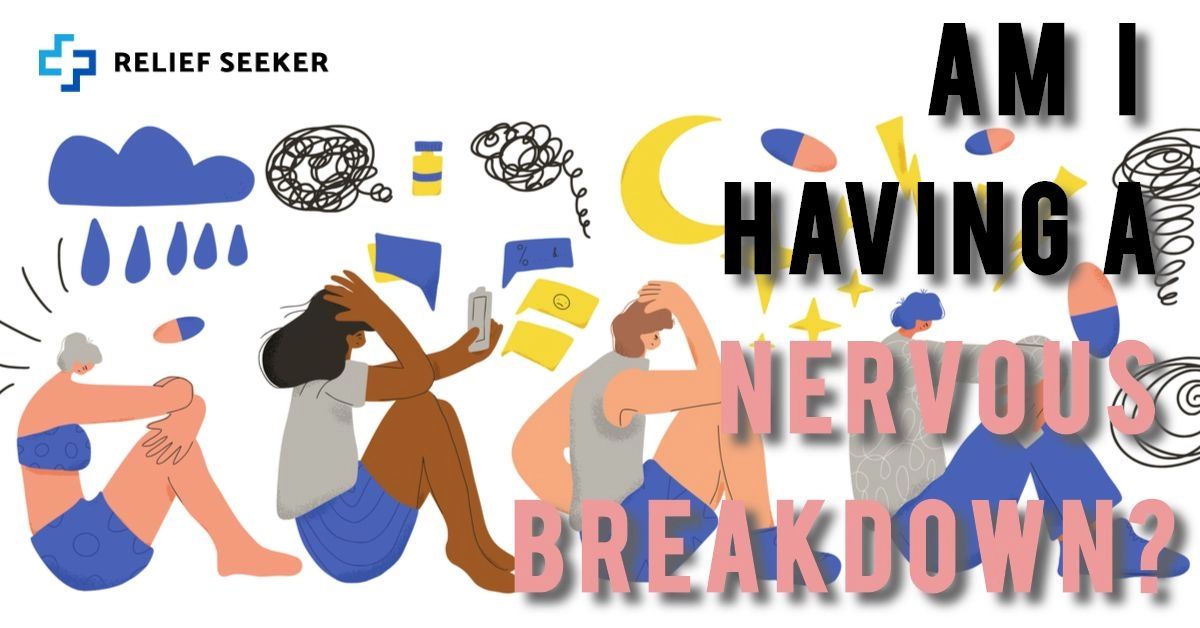Tens of millions of people in the U.S. suffer from mental health issues. Yet, only half those people get treatment. If left untreated, conditions such as stress, anxiety disorder, and depression can lead to a nervous breakdown.
Nervous breakdown isn’t a healthcare term, but it refers to a break in reality or a self-imposed upheaval of one’s life because of a life event or mental illness.
Pile a lack of self-care, possibility of self-harm, and an interruption from daily life (such as COVID-19), and you've got yourself a recipe for disaster. If you’ve ever asked yourself the question, “Am I having a nervous breakdown?” You’re not alone.
Discover the causes and symptoms of a nervous breakdown — and what you can do if you’re already experiencing one.
What Is a Nervous Breakdown?
The term ‘nervous breakdown’ refers to an episode of mental exhaustion or extreme mental illness. It’s usually accompanied by strange, erratic, or extreme behavior. Some people experience paranoia, hallucinations, or a break in reality.
Most people that suffer from this disorder also suffer from other mental health issues or have recently experienced an extremely stressful life change (such as a new job, loss of a loved one, or a financial crisis).
Nervous Breakdown Causes
Nervous breakdowns happen for reasons, both big and small. You could have a nervous breakdown as the result of typical workday stress or because of major trauma.
This type of breakdown often leads to larger-than-life or erratic behaviors. They’re often caused by major life events — but often they lead to patients making rash decisions or dangerous behavior.
Nervous breakdowns are often resulted by or accompanied by a break in reality. Many people that suffer from this type of event believe they are being stalked, followed, or watched by the government.
Since nervous breakdowns are often related to mental illness or a history of family illness, the breakdown is often intensified by irrational thoughts and behaviors.
The most common causes of mental breakdowns include:
- Chronic anxiety
- Work stress
- Trauma
- Major financial stress
- Life changes
- Medical issues
- Insomnia
- Mental illness or disorders (Bipolar, schizophrenia, borderline personality disorder)
- Post-traumatic stress disorder
If you’re wondering if you’re having a nervous breakdown but don’t connect with any of the above causes, you should still get diagnosed by a doctor or mental health professional.
Sometimes it isn’t easy to maintain a non-objective eye when identifying factors that may lead to a mental break.
Who Is High-Risk for a Breakdown?
Nervous breakdowns can happen to just about anybody. Risk factors, such as intense stress (especially when left untreated) can lead to erratic behaviors and dangerous mood swings.
The people at the highest risk of having a mental breakdown include those who have just undergone a major life change or have a history (or family history) of mental illness.
Major life changes can be both good or bad, to trigger a nervous breakdown. Sometimes change is challenging for the body to process; this often happens after or during repressing one’s feelings.
Major life changes can be anything from getting a new job, a divorce, loss of a job, loss of a loved one, the aftermath of a trauma, or hitting a major milestone (such as a birthday or a child moving out of the house for the first time).
A history of chronic or mental illness is also a major factor. People that suffer from chronic (or even sudden illnesses) can often find coping too much to handle.
Mental illnesses such as bipolar disorder, borderline personality disorder, or schizophrenia can lead to a break in reality, too. This condition happens most often when a patient can’t cope with their life circumstances any longer.
People with family members suffering from chronic conditions or mental disorders can be affected too.
Am I Having a Nervous Breakdown? Symptoms of a Nervous Breakdown
The physical symptoms of a nervous breakdown vary from patient to patient. Some people may experience nearly all of the below symptoms — while others may only experience a few.
If you’re worried that you’re having a nervous breakdown, you’ll want to get a diagnosis from a doctor or mental health professional, as some symptoms don’t align with the symptoms others may experience. Self-diagnosing is practically impossible because everyone experiences different symptoms.
- Anxiety
- Change in appetite
- Chest pain
- Chronic pain
- Aching body/muscles
- Depression
- Extreme behaviors (erratic driving, drinking more than usual, using drugs, a sudden interest in high-intensity sports)
- Extreme mood changes
- Hallucinations (including irrational comments, detachment from reality, phobias, etc.)
- Inability to focus
- Inability to relax
- Indigestion
- Nausea
- Not showing up to work
- Panic attacks
- Paranoia
- Poor hygiene
- PTSD
- Self-isolation
- Sleep disorders (insomnia, sleeping too much)
- Sudden disinterest in social activities
- Thoughts of hurting yourself or others
- Trauma flashbacks
- Trembling
- Thoughts of suicide
Preventing Nervous Breakdowns
The best way to avoid nervous breakdowns is by preventing them altogether. While you may not be able to prevent the causes of a nervous breakdown (trauma, loss of a job, financial stress, etc.), avoiding some behaviors can reduce your chance of having one.
The lifestyle behaviors associated with preventing nervous breakdowns are similar to preventing most chronic and mental illnesses:
- Get enough sleep
- Avoid caffeine, alcohol, and nicotine
- Don’t do recreational drugs
- Eat nutritious foods and avoid allergens
- Take vitamins and supplements
- Exercise for at least 30 minutes a day
Sleep
Getting enough sleep is so important. Sometimes, it’s impossible to get enough sleep if you suffer from anxiety and insomnia (two conditions related to nervous breakdowns).
Simply partaking in the other behaviors on this list should lead to better sleep, but you can always contact a sleep expert or psychiatrist to determine if you have a sleep disorder. You may be able to get a prescription for sleep medication to help you get one solidly good night of sleep, too.
Natural treatments such as St. John’s wort and acupuncture may help too.
Avoid Stimulants and Recreational Drugs
Stimulants such as alcohol, nicotine, caffeine, and drugs should all be avoided if you’re concerned you’re having or about to have a mental breakdown.
These stimulants can increase your brain's stress hormones that lead to anxiety attacks, such as cortisol and adrenaline. Recreational drugs can also increase hormones in your system and lead to or exacerbate hallucinations.
If you’re addicted to any drugs, it’s important to seek medical treatment before going off the drug cold turkey. Doing so could lead to suicidal thoughts and behaviors, withdrawal symptoms, and even stronger hallucinations.
Eat Nutritious Foods
The foods we eat can play a major role in our bodies’ chemistries. Nutritious foods can deliver vitamins and nutrients to every important system in our bodies.
When we eat the right foods, we support our systems; when we don’t, our bodies don’t function as efficiently as they’re designed to.
If you can’t absorb all the nutrients your body needs through food (vegetarians often don’t get enough iron without meat, and people with allergies often can’t get certain vitamins), you may want to consider taking a daily supplement.
Exercise
Exercise plays a major role in producing feel-good hormones, such as serotonin, endorphins, and dopamine. If you aren’t getting enough exercise, your body might not be able to regulate your hormones.
Most experts recommend exercising for at least 30 minutes a day. But if you’re too stressed or depressed to make time to exercise, your psychiatrist might end up prescribing an antidepressant to help get you out the door and motivated to work out.
All of these lifestyle choices can help prevent a nervous breakdown. If your critical systems aren’t supported through diet, exercise, and sleep, you won’t be able to provide your body the self-care structure it needs to regulate hormones and manage stress.
Nervous Breakdown Treatment
If you’re already suffering from a nervous breakdown, there are steps you can take to heal. Most doctors recommend a combination of lifestyle changes, medication, and therapy.
While lifestyle changes are an important part of reversing the symptoms of a nervous breakdown, sometimes medication is also needed to help the patients climb out of the depression that prevents them from making those changes on their own.
Talk therapy can help patients cognitively work through paranoid thoughts and behavior and many other mental health issues.
Lifestyle Changes
One of the most helpful things you can do during a mental break is to start seeing a therapist. Talk therapy can help you work sort out big feelings and differentiate reality from fantasy.
Your therapist may recommend a few different types of treatment, including cognitive-behavioral therapy (CBT), exposure therapy, and talk therapy. This can help reduce anxiety and offer some clarity around phobias, hallucinations, and paranoia.
Your therapist will probably also recommend a few techniques to help you cope when your anxiety or stress goes up. Deep breathing and visualization exercises are common ways to lower your heart rate and keep your stress levels down.
Your therapist may even recommend joining a support group like Wisdo to help deal with some of the symptoms and side-effects of this disorder.
Medication
Many therapists will also recommend seeing a psychiatrist get a prescription for antidepressants, antipsychotics, or mood stabilizers.
These medications can help patients balance out their body's brain chemicals. They can also help reduce some of the more severe symptoms of depression, anxiety, and other mental disorders, allowing you to focus on therapy and lifestyle changes.
If you or a family member is experiencing a nervous breakdown, it’s important to seek professional help. If you or someone you know is considering hurting themselves or others, call 911 immediately to get help.

